|
|
|
Sort Order |
|
|
|
Items / Page
|
|
|
|
|
|
|
| Srl | Item |
| 1 |
ID:
175540
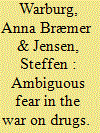

|
|
|
|
|
| Summary/Abstract |
This article explores the social and moral implications of Duterte's war on drugs in a poor, urban neighbourhood in Manila, the Philippines. Drawing on long-term ethnographic fieldwork, surveys, and human rights interventions, the article sheds light on policing practices, social relations, and moral discourses by examining central perspectives of the state police implementing the drug war, of local policing actors engaging with informal policing structures, and of residents dealing with everyday insecurities. It argues that the drug war has produced a climate of ambiguous fear on the ground, which has reconfigured and destabilised social relations between residents and the state as well as among residents. Furthermore, this has led to a number of subordinate moral discourses — centred on social justice, family, and religion — with divergent perceptions on the drug war and the extent to which violence is deemed legitimate.
|
|
|
|
|
|
|
|
|
|
|
|
|
|
|
|
| 2 |
ID:
101285


|
|
|
|
|
| Publication |
2010.
|
| Summary/Abstract |
Sudhir Venkatesh and Steven Levitt's influential 2000 article transformed the way social scientists study gangs by showing the context in which Chicago gang members built an organization modeled on a corporation. But if this research helped to demonstrate that the underground economy is a logical response to the inner city's isolation from the rest of the country, it also makes it difficult to see that the very same factors that have led to urban decay and "social isolation" (i.e., escalating unemployment, the loss of manufacturing jobs, and the emergence of gangs to fill bureaucratic voids) serve to connect gangs to wider social worlds. This study expands upon recent gang research by detailing the improvisational economic and social practices, as well as the intricate narratives, and the social practices that allow Chicago gangs and their members to access a variety of people, institutions, and resources, while marking the diverse modes of historical consciousness that gang affiliates develop. A gang that I will here be calling the "Divine Aces" forms a powerful case in point
|
|
|
|
|
|
|
|
|
|
|
|
|
|
|
|
| 3 |
ID:
126223
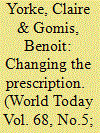

|
|
|
|
|
| Publication |
2012.
|
| Summary/Abstract |
The fifty-year global war against drugs has failed and the time has come to admit it. Claire Yorke and Benoit Gomis argue that a new approach is now needed
|
|
|
|
|
|
|
|
|
|
|
|
|
|
|
|
| 4 |
ID:
171022
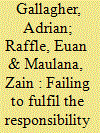

|
|
|
|
|
| Summary/Abstract |
The article provides the first substantive analysis of the war on drugs in the Philippines under the Responsibility to Protect. It develops in two stages. First, it argues that the war on drugs constitutes crimes against humanity through an analysis of, (i) extrajudicial killings and vigilante justice, (ii), dehumanisation, and, (iii) the exaggeration of threat. Second, it examines the response of the permanent five members of the UN Security Council (p5) and the Association of Southeast Asian Nations (ASEAN). Despite that the US, the UK, and France have expressed public concerns, we show that they prioritise counter-terrorism and trade over the Responsibility to Protect. Meanwhile, China and Russia uphold the view that the war on drugs is a matter of domestic jurisdiction. Regarding ASEAN, we draw on 26 semi-structured elite interviews conducted in South East Asia (2016-2018) to evidence that the elites prioritise state sovereignty and non-interference. The outcome is that there is a significant protection deficit as the government of the Philippines, the p5, and ASEAN are failing to protect those targeted in the war on drugs. We hope that the article will act as a catalyst for a much needed conversation on the international community’s political, legal, and moral responsibilities regarding mass violence against drug users in international relations.
|
|
|
|
|
|
|
|
|
|
|
|
|
|
|
|
| 5 |
ID:
144337
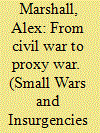

|
|
|
|
|
| Summary/Abstract |
The use of surrogate or ‘proxy’ actors within the context of ‘irregular’ or guerrilla conflict within or between states constitutes a phenomenon spanning nearly the whole of recorded human military history. Yet it is a phenomenon that has also acquired urgent contemporary relevance in the light of the general evolution of conflict in Ukraine and the current Middle East. This introduction to a special issue on the theme investigates some potentially important new avenues to studying the phenomenon in the light of these trends.
|
|
|
|
|
|
|
|
|
|
|
|
|
|
|
|
| 6 |
ID:
185076
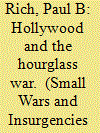

|
|
|
|
|
| Summary/Abstract |
This paper examines the cinema of the US-Mexican border in the context of an escalating drug war. It looks at movies released since the early 1980s and argues that Hollywood has supplied a large number of cinematic images of the ‘war on drugs’ that has more helped shape wider political and strategic debates. Using insights from strategic analysis, this paper seeks to show how cinema has represented the conflict between drug cartels, the Mexican state as well as various US security agencies such as the FBI, CIA, and DEA. The paper explores how these cinematic depictions straddle national boundaries and have evolved from being an extension of the western border genre in the 1980s into a more recent phase of action and war movies.
|
|
|
|
|
|
|
|
|
|
|
|
|
|
|
|
| 7 |
ID:
161654
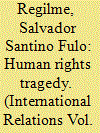

|
|
|
|
|
| Summary/Abstract |
How and to what extent do ideas and political discourses shape bilateral cooperation between a powerful state and its weaker ally? Why do weaker states act in ways that diverge from the expectations and preferences of the powerful state despite the contractual agreement borne out of bilateral cooperation? Drawing perspectives from constructivism and principal–agent framework, this article provides a conceptual-interpretative analysis of post-9/11 counterterror cooperation of the US government with Colombia – America’s long-standing ally in the region. The case study shows that the provision of security is not only conceived in the domestic levels but also produced in the transnational sphere; that security provision is not only a materially oriented political activity but also an ideational-discursive exchange where political actors legitimize and facilitate interstate cooperation; and, finally, that the power of dominant states is not only produced from within them but strategically reconstituted by weaker powerful states.
|
|
|
|
|
|
|
|
|
|
|
|
|
|
|
|
| 8 |
ID:
155530
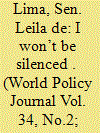

|
|
|
|
|
| Summary/Abstract |
Prison walls cannot prevent Philippine President Rodrigo Duterte’s fiercest foe from speaking out. From her cell, Sen. Leila de Lima calls the 71-year-old ruler a “geriatric dictator wannabe” involved in “mass serialized murder” and says history will vindicate her.
|
|
|
|
|
|
|
|
|
|
|
|
|
|
|
|
| 9 |
ID:
131451
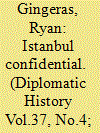

|
|
|
|
|
| Publication |
2013.
|
| Summary/Abstract |
This article provides an intimate survey of the construction and early evolution of one element of America's security relationship with Turkey: the development of joint counter-narcotics operations in the city of Istanbul. In exploring how American officials came to influence the policing of narcotics trafficking in Turkey's largest city between the years 1948 and 1960, this piece hopes to contribute to two specific historiographical issues. First, the research presented here adds to the growing body of literature on the history of U.S. antinarcotics policies on the world stage. Secondly, it attempts to shed new light on the relationship between Turkey's narcotics economy and the evolution of the modern Turkish state. A close reading of how both Turkish and American officials approached narcotics trafficking at this stage in the Cold War affirms the degree to which law enforcement officials (particularly in counter-narcotics efforts) constrained their efforts for the sake of larger national security prerogatives. The case present here in this article provides instructive examples of how the so-called "war on drugs," even at this embryonic stage, ultimately served to promote American hegemony in Turkey and beyond.
|
|
|
|
|
|
|
|
|
|
|
|
|
|
|
|
| 10 |
ID:
126224
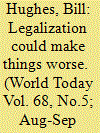

|
|
|
| 11 |
ID:
174125
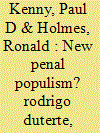

|
|
|
|
|
| Summary/Abstract |
Drawing on evidence from the Philippines, this paper investigates the so-called penal populism thesis. Penal populism refers to an understanding of justice in which criminal and anti-social activity should be harshly punished. The paper tests whether support for harsh penal policies, including the use of extrajudicial killings, is associated with underlying populist attitudes and preferences for charismatic leadership. Since coming to power in 2016, President Rodrigo Duterte has waged a violent and highly popular campaign against drug-related criminality. Based on survey modules fielded in 2016 and 2017, the paper demonstrates a positive relationship between populist attitudes and support for the campaign against illegal drugs in general and the extra-judicial killing of suspected drug users and dealers in particular. It also demonstrates a relationship between belief in the charisma of Duterte and support for the campaign against illegal drugs. The implications of the theory and results for the fields of populism and penal populism research are discussed.
|
|
|
|
|
|
|
|
|
|
|
|
|
|
|
|
| 12 |
ID:
115495
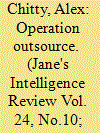

|
|
|
| 13 |
ID:
134402
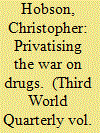

|
|
|
|
|
| Summary/Abstract |
A defining feature of the ‘9/11 wars’ has been the prominent role played by private military and security companies (pmsc). The growth of this market for military and security services has not gone unnoticed. Yet the role pmsc have played in supporting the US-led war on drugs has largely gone under the radar, both literally and figuratively. The aim of this article is to look at the activities of pmsc funded by the USA in Latin America, and to consider the specific consequences that arise from employing them in the field of counter-narcotics. It is argued that the use of pmsc further entrenches a costly and unsuccessful way of dealing with drugs. There is a need to move from a strict prohibitionist stance and consider alternatives to the war on drugs approach, but the use of pmsc creates another strong vested interest in maintaining an increasingly problematic and costly status quo.
|
|
|
|
|
|
|
|
|
|
|
|
|
|
|
|
| 14 |
ID:
139567
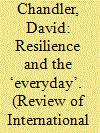

|
|
|
|
|
| Summary/Abstract |
Over the last decade there has been a shift towards critical understandings of ‘liberal peace’ approaches to international intervention, which argue that local culture holds the key to the effectiveness of peace interventions. In this ‘bottom-up’ approach, peace, reconciliation, and a ‘culture of law’ then become secondary effects of sociocultural norms and values. However, these liberal peace critiques have remained trapped in the paradox of liberal peace: the inability to go beyond the binaries of liberal universalism and cultural relativism. This understanding will be contrasted with the rise of ‘resilience’ approaches to intervention – which build on this attention to the particular context of application but move beyond this paradox through philosophical pragmatism and the focus on concrete social practices. This article clarifies the nature of this shift through the focus on the shifting understanding of international intervention to address the failings of the ‘war on drugs’ in the Americas.
|
|
|
|
|
|
|
|
|
|
|
|
|
|
|
|
| 15 |
ID:
183892
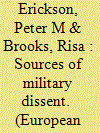

|
|
|
|
|
| Summary/Abstract |
How do militaries push back when they oppose civilian initiatives? This article analyses the sources and character of military dissent, focusing on the United States. It details the sources of military preferences over policy and strategy outcomes, emphasising the interplay of role conceptions with other material and ideational factors. It then presents a repertoire of means – tactics of dissent – through which military leaders can exert pressure, constraining and shaping civilians’ decision-making calculus and the implementation of policy and strategy choices. Empirically, it traces military dissent in the 1990s-era humanitarian interventions; the US's ‘War on Drugs’ beginning in the 1980s; and the Afghanistan surge debate in 2009. In so doing, the article contributes to a broader research programme on military dissent across regime types. It also expands scholars’ understandings of preference formation within militaries and illuminates the various pathways through which military dissent operates and potentially undermines civilian control.
|
|
|
|
|
|
|
|
|
|
|
|
|
|
|
|
| 16 |
ID:
103966
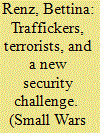

|
|
|
|
|
| Publication |
2011.
|
| Summary/Abstract |
The collapse of the Soviet Union precipitated the massive expansion of drug use and trade in Russia. The country now has one of the largest populations of injecting drug users in the world and has become the largest single-country market for Afghan heroin. In 2003 the Federal Service for the Control of the Drugs Trade was created to coordinate a comprehensive counternarcotics strategy appropriate to the scale of this threat. The service continues to face a number of challenges in its early stages of development. However, it has made considerable advances in improving responses to large-scale organised crime and in building international cooperation.
|
|
|
|
|
|
|
|
|
|
|
|
|
|
|
|
| 17 |
ID:
187735
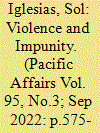

|
|
|
|
|
| Summary/Abstract |
As president from 2016 to 2022, Rodrigo Duterte captured the judiciary, dominated the legislature, attacked the media, and presided over a campaign of mass killing, leaving an estimated 30,000 alleged drug criminals dead. Despite wielding vast amounts of power, Duterte stepped down after the national elections on May 9, 2022 in a largely peaceful transfer of power to Ferdinand Marcos Jr., son and namesake of the former dictator deposed in 1986. Why did Duterte amass power without causing full democratic collapse into authoritarian rule? The Philippines experienced backsliding to competitive authoritarianism: while elections remain free and somewhat fair, other features of democracy like civil liberties and political freedoms have eroded badly because of mass violence. The Philippine case demonstrates the autocratizing effect of an emerging form of political violence: a focused campaign of state terror that produces fear and electoral success. I present evidence from two cases—the national “war on drugs” and its local antecedent in Davao City—to explain how violence escalates, provokes accountability, evades culpability, and contributes to democratic backsliding without immediate collapse to authoritarianism. With the election of Marcos Jr., the impunity of the former incumbent is likely to become institutionalized, and democratic backsliding is unlikely to be reversed.
|
|
|
|
|
|
|
|
|
|
|
|
|
|
|
|
| 18 |
ID:
116847
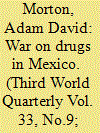

|
|
|
|
|
| Publication |
2012.
|
| Summary/Abstract |
This article focuses on the continued attractiveness of 'failed state' strategic thinking that stretches across policy-making and academic circles and links it to the issue of the War on Drugs in Mexico. It does so in order to challenge, if not reject, caricatured representations of 'failed states'. Moreover, it offers an alternative understanding of the War on Drugs and issues of state crisis in Mexico. Rather than assume that state power is rooted within clear and immobile boundaries, it is more fruitful to rethink transformations in state space that cannot be isolated from underlying historical patterns of development and political economy. A political economy approach to state space is therefore better able to draw attention to the twin geopolitical processes shaping the War on Drugs in Mexico: (1) the geographic restructuring of the trade in cocaine and (2) the coeval onset and consolidation of neoliberalism.
|
|
|
|
|
|
|
|
|
|
|
|
|
|
|
|
| 19 |
ID:
167383
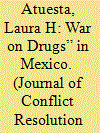

|
|
|
|
|
| Summary/Abstract |
The objective of this text is to describe the three categories that the Drug Policy Program at the Center for Teaching and Research in Economics (CIDE-PPD) database comprises, their limitations, and their main features. Additionally, we explain what we believe to be the source of the database we originally received and analyze its accuracy by comparing it with public records. We describe the validation and codification processes the database was subjected to, as well as the main biases and limitations the database may have. Additionally, we offer a preliminary analysis of the type of research that the CIDE-PPD Database can support. This analysis is not only relevant to those interested in studying the “war on drugs” in Mexico but also to those studying conflict in other countries involved in illegal drug production and trafficking, as well as countries experiencing conflicts related to organized crime.
|
|
|
|
|
|
|
|
|
|
|
|
|
|
|
|
|
|
|
|
|